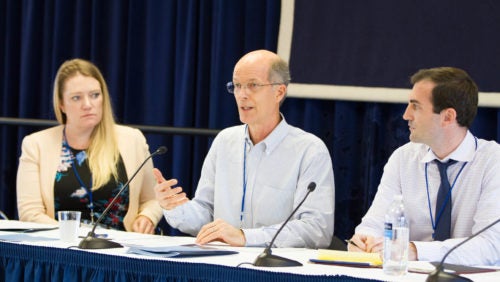O’Neill Institute: Addressing Politicization of Health Care and Public Health Services
June 25, 2018

Katie Gottschalk, deputy director of the O'Neill Institute for National and Global Health Law, O'Neill Institute program director Eric Lindblom and Will Tilburg of the Maryland Medical Cannibis Commission lead a discussion on day one of "Addressing the Politicization of U.S. Health Care and Public Health Services" at Georgetown Law on June 21.
Health with justice. Human rights. Equity. Rule-based international order through organizations like the United Nations. Those values and others are being starkly contradicted by U.S. policy today — in ways that are deeply disturbing and even unconscionable, said University Professor Lawrence O. Gostin, the faculty director of the O’Neill Institute for National and Global Health Law at Georgetown Law.
“Ultimately, we believe that the same values we hold in the United States for what I call ‘health with justice’ applies everywhere, no matter where you go and no matter who you are — you have the right to a healthy life and you have the right to dignity…we as a nation, and we’re proud of this, have tried very hard for so many years to champion those values,” Gostin said.
Gostin outlined just some of the U.S. policies and recent developments threatening public health at the start of a two-day conference on “Addressing the Politicization of U.S. Health Care and Public Health Services” sponsored by the O’Neill Institute on June 21 and 22.
States opting out of the Affordable Care Act, with the individual mandate gutted in the recent tax bill; recent attacks on “wildly popular” ACA provisions; turnover at the Department of Health and Human Services and the Centers for Disease Control; directives against science-based and evidence-based research; gun violence that is the highest of any country in the world; reversal of key initiatives on climate change; and U.S. withdrawal from the U.N. Human Rights Council headed a long list of concerns. And despite the recent Executive Order to keep families together, the Administration’s statements regarding immigration policies — which also impact global health — have been troubling.
James G. Hodge Jr. (LL.M.’96) of Arizona State University’s Sandra Day O’Connor College of Law, a key organizer of the event, introduced Gostin as “one of the truly great visionaries of our time.”
“You’re going to get a perspective here that you just can’t get from any other place or person in the United States,” Hodge said, noting that Gostin is known globally for his work in health law.
Hodge, Georgetown Law Professor from Practice Timothy M. Westmoreland and the O’Neill Institute’s Sonia Canzater, Rebecca Reingold and Sarah Roache led panels that included health justice perspectives; the ACA, Medicare/Medicaid and other programs; gun control laws and policies; and more. Umair A. Shah of Harris County Public Health in Houston delivered the luncheon address on “Assuring Health Equity in a Turbulent U.S. Health Policy Arena.”
O’Neill Institute Deputy Director Katie Gottschalk led a panel on the federal-state battleground over the legalization of marijuana for medical and nonmedical uses. The O’Neill Institute’s Eric Lindblom, program director for Tobacco Control and Food and Drug Law, outlined some of the research from states. “If you are a state, and you legalize cannabis…and you don’t do it in ways that promote the legitimate policy goals…and you don’t do it in ways that protect and promote the public health, you’re going to provide a reason for the Administration or the federal government to clamp down,” Lindblom said.
Timely
To the young lawyers in the room listening to the policies and the problems, Gostin said, ‘You are our hope.’”
“We need you now more than we’ve ever needed you; now is not the time to pull back…” he said, urging attendees to address the “deep inequities” existing in the U.S. and around the world and remembering values. “Hold on to what you know is right: decency, justice, welfare, health of a population. This conference could not have been more timely.”